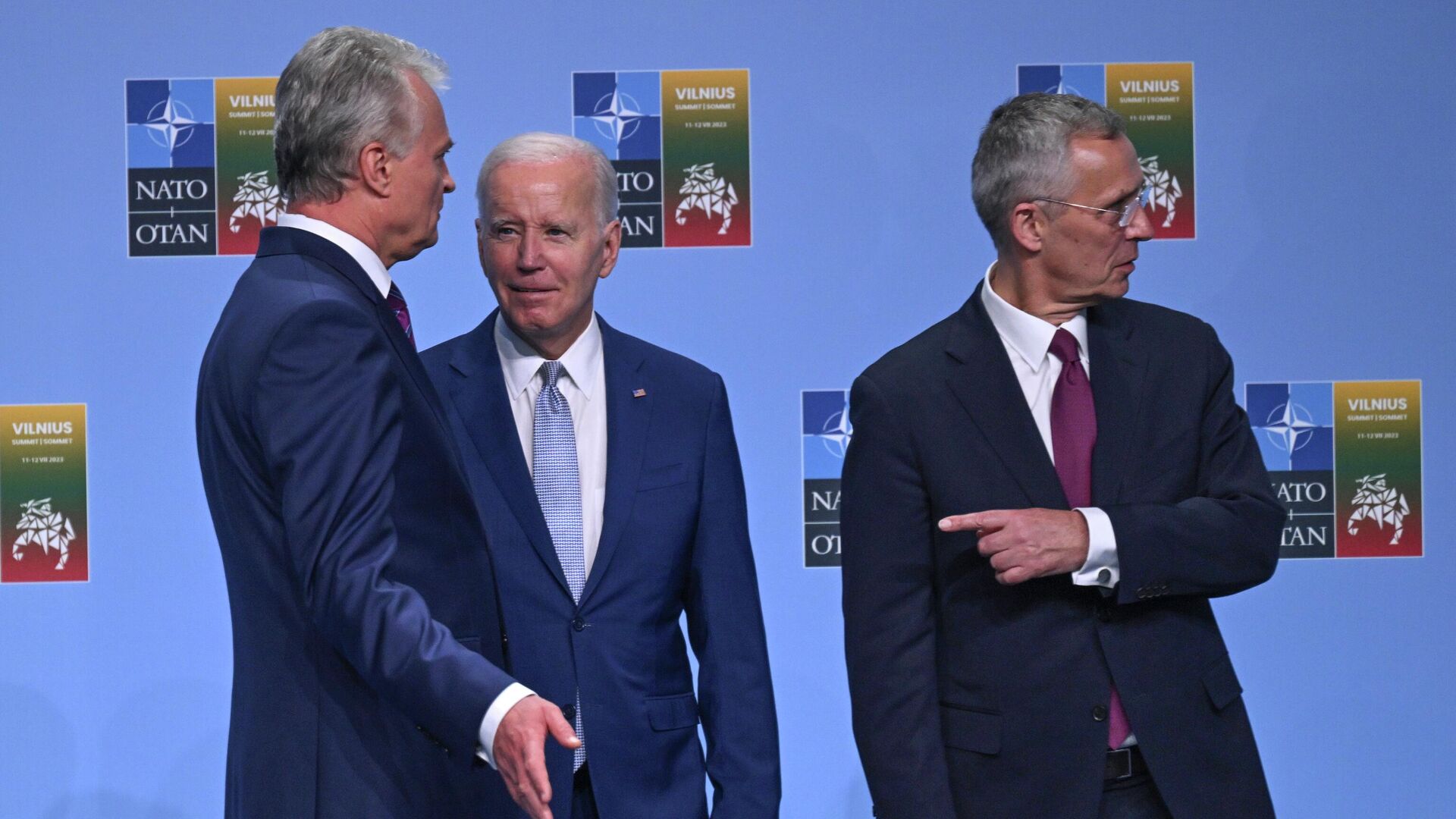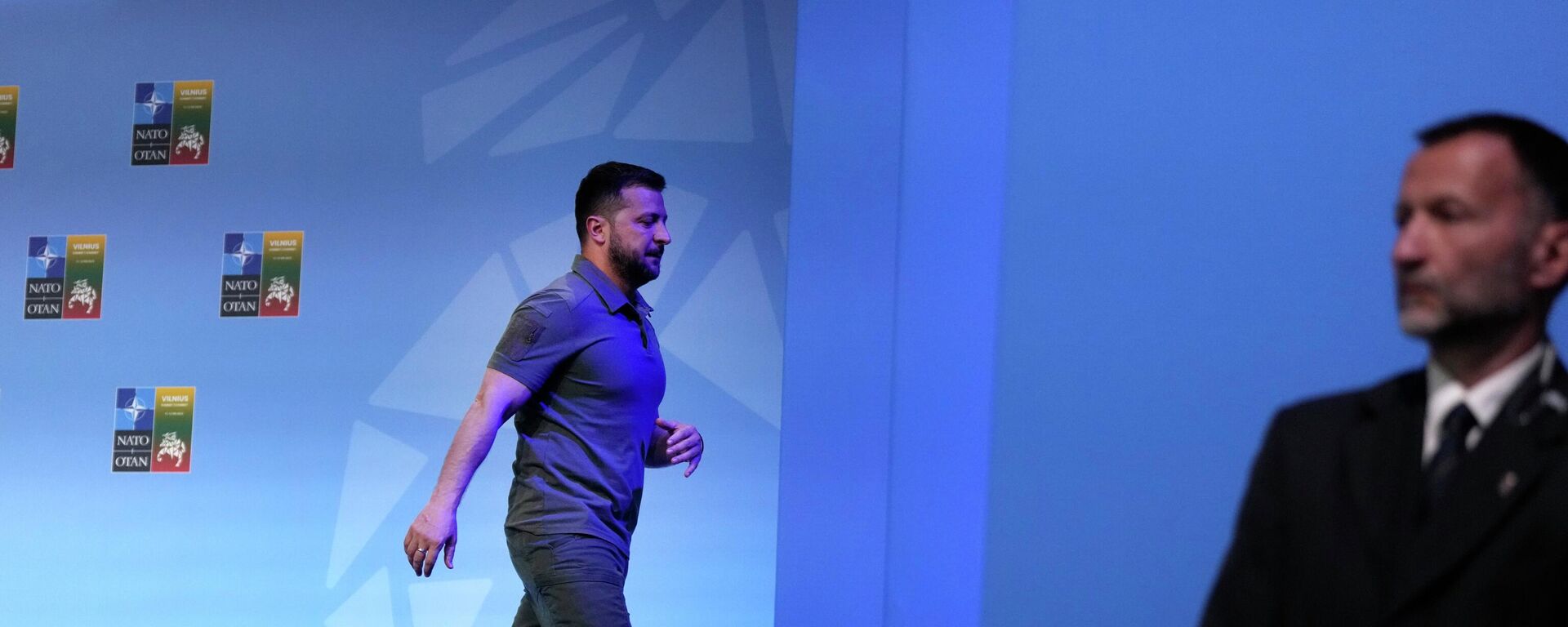https://sputnikglobe.com/20230713/failure-of-nato-summit-to-admit-ukraine-widens-fissures-in-us-led-alliance-1111853389.html
Failure of NATO Summit to Admit Ukraine Widens Fissures in US-Led Alliance
Failure of NATO Summit to Admit Ukraine Widens Fissures in US-Led Alliance
Sputnik International
Chris Helali and Dr Radhika Desai discussed the outcomes of the NATO summit in Vilnius, where Ukrainian President Volodymyr Zelensky's hopes of fast-track membership were dashed.
2023-07-13T20:40+0000
2023-07-13T20:40+0000
2023-07-13T20:38+0000
nato
nato summit
vilnius
ukraine
analysis
nato summit in vilnius
joe biden
russia
https://cdn1.img.sputnikglobe.com/img/07e7/07/0b/1111822425_0:0:3072:1728_1920x0_80_0_0_8d41aaf62834f03dd443bbe5f853b151.jpg
The rejection of Ukrainian membership at the NATO summit shows the failure of the US strategy to destabilise Russia, pundits say.The meeting in the Lithuanian capital Vilnius was long on rhetoric in support of Kiev, but leaders of the 31-member states — especially US President Joe Biden — made it clear that Ukraine could not join while its conflict with Russia continued.The stance subsequently angered Ukrainian President Volodymyr Zelensky, NATO's guest of honour, who then lashed out at Western powers and prompted accusations of ingratitude in return.Political analyst Chris Helali told Sputnik that Zelensky's very presence at the summit was a "great escalation and provocation" towards Russia.The US-dominated military bloc also welcomed new member Finland — which shares a long border with Russia's north-western regions — while haggling over Sweden's accession continued with Turkiye, which stayed neutral regarding the Ukraine conflict but is trying to leverage membership of the European Union.However, those continued attempts to push the alliance's boundaries eastward — breaking promises made by the US in the 1990s — risks bringing the world to the brink of war.The analyst highlighted that the efforts prove the NATO "death cult" does not want peace but rather confrontation with Russia and China. "And it's willing to bring the world to the edge of thermonuclear catastrophe to do that," he added.The investigative journalist further warned that peacemakers within NATO were far outnumbered by the warmongers.Dr. Radhika Desai noted that NATO's "proxy war" on Russia in Ukraine was proving to be "a big disaster for Joe Biden.""Joe Biden essentially has instigated this proxy war against Russia in which Ukraine is the proxy chiefly as a means of re-subordinating Europe to itself," Desai said, recalling that Washington had done the same in the former Yugoslavia in 1999.However, not all has gone according to Washington's plans.The failure of US ambitions to weaken Russia economically or militarily, let alone provoke regime change or Balkanise the country, have forced Washington to change tack and open diplomatic back channels with Moscow.Desai noted recent reports that in April the White House initiated "B-level type diplomacy" by allowing a group led by Richard Haass, the outgoing head of the Council on Foreign Relations, to meet Russian representatives to discuss a peace settlement.The academic argued that NATO's obsession with confronting Russia could ultimately be its undoing.For more in-depth analysis of current affairs, tune in to our Sputnik Radio show By Any Means Necessary.
https://sputnikglobe.com/20230713/scott-ritter-nato-summit-serves-up-cringe-nothing-burger--1111854432.html
vilnius
ukraine
russia
Sputnik International
feedback@sputniknews.com
+74956456601
MIA „Rossiya Segodnya“
2023
James Tweedie
https://cdn1.img.sputnikglobe.com/img/07e4/08/1c/1080307270_0:3:397:400_100x100_80_0_0_7777393b9b18802f2e3c5eaa9cbcc612.png
James Tweedie
https://cdn1.img.sputnikglobe.com/img/07e4/08/1c/1080307270_0:3:397:400_100x100_80_0_0_7777393b9b18802f2e3c5eaa9cbcc612.png
News
en_EN
Sputnik International
feedback@sputniknews.com
+74956456601
MIA „Rossiya Segodnya“
Sputnik International
feedback@sputniknews.com
+74956456601
MIA „Rossiya Segodnya“
James Tweedie
https://cdn1.img.sputnikglobe.com/img/07e4/08/1c/1080307270_0:3:397:400_100x100_80_0_0_7777393b9b18802f2e3c5eaa9cbcc612.png
nato leaders' summit in the lithuanian capital vilnius, ukrainian president volodymyr zelensky's hopes of joining nato dashed, can the us nato afford to keep arming ukraine for their proxy war with russia?
nato leaders' summit in the lithuanian capital vilnius, ukrainian president volodymyr zelensky's hopes of joining nato dashed, can the us nato afford to keep arming ukraine for their proxy war with russia?
Failure of NATO Summit to Admit Ukraine Widens Fissures in US-Led Alliance
Political analyst, researcher and independent investigative journalist Chris Helali and Dr. Radhika Desai, a professor at the University of Manitoba and director of the Geopolitical Economy Research Group, spoke with Sputnik on the outcome of the NATO Vilnius summit, where hopes to fast-track Ukraine's bloc membership were dashed.
The rejection of Ukrainian membership at the NATO summit shows the failure of the US strategy to destabilise Russia, pundits say.
The meeting in the Lithuanian capital Vilnius was long on rhetoric in support of Kiev, but leaders of the 31-member states — especially US President
Joe Biden — made it clear that Ukraine could not join while its conflict with Russia continued.
The stance subsequently angered Ukrainian President Volodymyr Zelensky, NATO's guest of honour, who then lashed out at Western powers and prompted
accusations of ingratitude in return.
Political analyst Chris Helali told
Sputnik that Zelensky's very presence at the summit was a "great escalation and provocation" towards Russia.
"I don't really think it's about Ukraine or the Ukrainian people. I ultimately think it's about Russia and it's about encircling Russia," he argued. "It's about provoking Russia and it's about bringing conflict to Russia's borders."
The US-dominated military bloc also welcomed new member Finland — which shares a long border with Russia's north-western regions — while haggling over
Sweden's accession continued with Turkiye, which stayed neutral regarding the Ukraine conflict but is trying to leverage membership of the European Union.
However, those continued attempts to push the alliance's boundaries eastward — breaking promises made by the US in the 1990s — risks bringing the world to the
brink of war."It's not a secret that for decades Russia has said no to NATO's expansion, especially in Ukraine and around its borders," Helali noted. "What we're seeing is NATO trying to push itself to the very edge before open conflict with Russia."
The analyst highlighted that the efforts prove the NATO "death cult" does not want peace but rather confrontation with Russia and China. "And it's willing to bring the world to the edge of thermonuclear catastrophe to do that," he added.
The investigative journalist further warned that peacemakers within NATO were far outnumbered by the warmongers.
"Thankfully, there's still some sane people who are saying we can't give a timeline because this could really provoke a war: World War Three, we're on the verge of it," Helali said. "But clearly, many leaders are very, very excited to have Ukraine in and to do everything... to have not only conflict with Russia, but they're salivating over regime change. That's the real danger here."
Dr. Radhika Desai noted that NATO's "proxy war" on Russia in Ukraine was proving to be "a big disaster for Joe Biden."
"Joe Biden essentially has instigated this proxy war against Russia in which Ukraine is the proxy chiefly as a means of re-subordinating Europe to itself," Desai said, recalling that Washington had done the same in the former Yugoslavia in 1999.
However, not all has gone according to Washington's plans.
"The endless supply of weapons to Ukraine would somehow mean that the United States would prove that Ukraine would prevail over Russia," Desai explained. However, "what's become very clear over the last several months is that this is not happening. The much-heralded counteroffensive of Ukraine has not been forthcoming."
The failure of US ambitions to weaken Russia economically or militarily, let alone provoke regime change or Balkanise the country, have forced Washington to change tack and open diplomatic back channels with Moscow.
Desai noted recent reports that in April the White House initiated "B-level type diplomacy" by allowing a group led by Richard Haass, the outgoing head of the Council on Foreign Relations, to meet Russian representatives to discuss a peace settlement.
The academic argued that NATO's obsession with confronting Russia could ultimately be its undoing.
"It's quite possible that the electorates of many European countries will say enough with NATO. There is already the polls showing that there are more and more countries of which where the ordinary people are questioning the utility of NATO," Desai said. "In terms of actually disbanding the organization, I think individual countries may, in fact, leave."
For more in-depth analysis of current affairs, tune in to our Sputnik Radio show By Any Means Necessary. 



